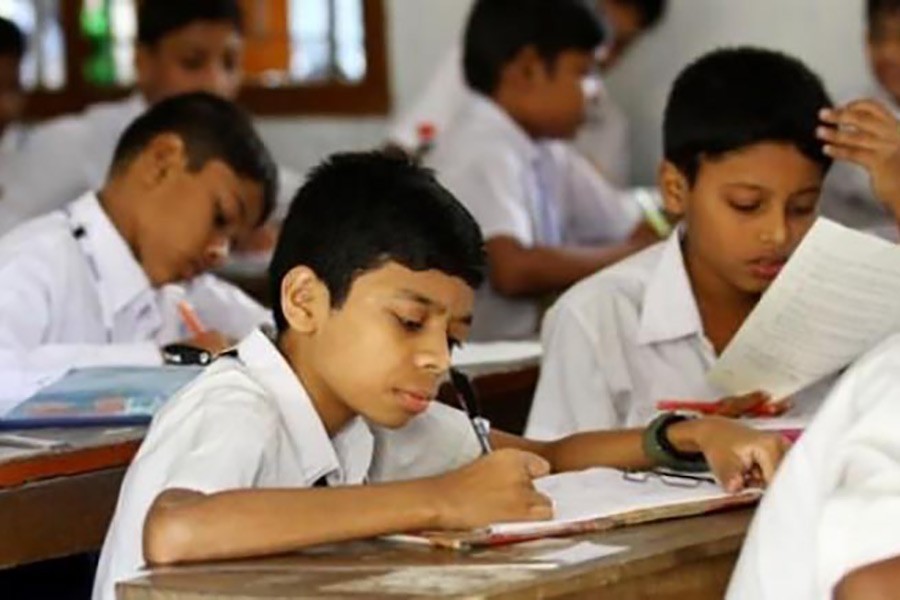
Published :
Updated :

Eminent citizens, many of them revered educationists, have expressed their concern over the government plan to form an education board aimed at holding primary education completion (PEC) examination. Educationists and others caring for education, particularly at the primary level, have reasons to be worried. The government has already drafted what is called the "Primary Education Board Law 2021" under which a primary education board or boards will function much like the different education boards responsible for holding Secondary School Certificate (SSC) and Higher Secondary Certificate (HSC) examinations in the country.
In the first place, educationists and all involved with the formulation of the National Education Policy 2010 have never recommended a PEC examination. The law and any examination of this order will be contradictory to the spirit of the National Education Policy and also the radical changes to be brought about to the learning process by slashing the number of subjects for different classes of school. When the entire curricula from primary to class XII will be under review for making education time-befitting, it seems a section of the administration has a fascination for not only the outdated but also the retrogressive system that will hold back education undesirably.
The problem with the bureaucracy is that it has become accustomed to making decisions relegating some of the highly important recommendations made by the education policy formulators. At a time when educationists are in favour of redirecting focus on teaching and learning in classes more than acquiring the technique of obtaining higher scores in examinations, the administration wants to stick to its traditional evaluation system of merit.
To make education meaningful, creative, enjoyable and equal to the challenge of the fourth industrial revolution 4IR, there is no alternative to reposing confidence in teachers. On this count, the argument in favour of developing a highly qualified and skilled crop of teachers without doubt is very strong. The administration would have done the nation proud if it paid attention to this issue much earlier. Restoring the lost glory in the teaching profession is a must. To do so, highly qualified teachers have to be recruited and trained with salary packages commensurate with their credentials.
The new education policy approved has recommended no examination up to class III. Students of class IV and V will have five compulsory subjects along with physical, mental health and security, religion and cultural subjects to study. Evaluation of the five compulsory subjects -- Bangla, English, Mathematics, Science and Social Science will be made through continuous assessment of class work and examinations in proportion of 60 and 40 per cent respectively. For the rest assessment of class work will be enough.
When reports on this educational transformation were receiving wide publicity with the education minister extolling the virtue of the proposed system, there was no hint that something was brewing up in the shape of an education board law to apparently derail the well conceived reform. If anyone has any reservation for the proposed system, it is the lack of logistics and, more importantly, the right crop of teachers.
Clearly, the proposal for extensive class work assessment demands intensive teaching by dedicated teachers with unfailing integrity. But the prevailing situation is way behind the required manpower. At least there was a need for developing a qualified crop of teachers over the past 10 years and the existing set trained to take up the challenge. If 60 out of a total possible score of 100 for a subject are awarded through class works, teachers' integrity and responsibility have to be accepted first. But can they be trusted with the responsibility?
There may be some errant teachers who may have ended up making a hotchpotch because they are not qualified enough or are too insincere to do justice to their responsibility. But today or tomorrow teachers will have to assume the role of a friend, philosopher and guide if education is meant to work wonder for the young learners. If the examination-centric evaluation is retained, the proliferation of undesirable materials of educational aid cannot be checked. Guide books, made-easy and note books will continue to flood the market for students.
So the need right now is to make ready a teaching set-up capable of taking the challenge. This requires far bigger allocation than is granted for education. It is good to learn that research facilities for all the public universities are going to be ramped up. But the education pyramid's base has to be strong and dependable. So it is advisable to ignore the initial hiccups here and there that may emerge on account of inept teaching and evaluation by some teachers. In such cases, supervision and monitoring by an expert committee or a number of committees may detect the fault lines earlier and take remedial measures to avoid wrong evaluation and psychological trauma suffered by young learners.
There should be no compromise on aberration of examination that makes a mockery of acquiring knowledge by just focusing on scoring high. Primary education must get the priority right if the objectives of the National Education Policy have to be achieved.


 For all latest news, follow The Financial Express Google News channel.
For all latest news, follow The Financial Express Google News channel.